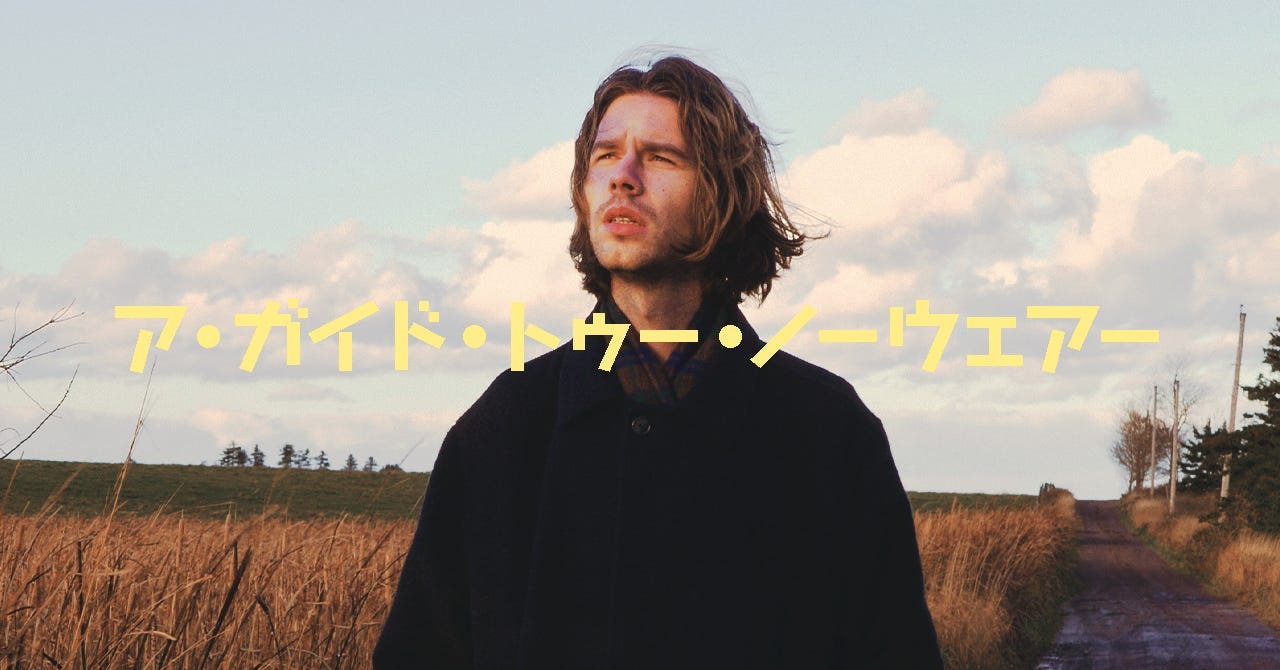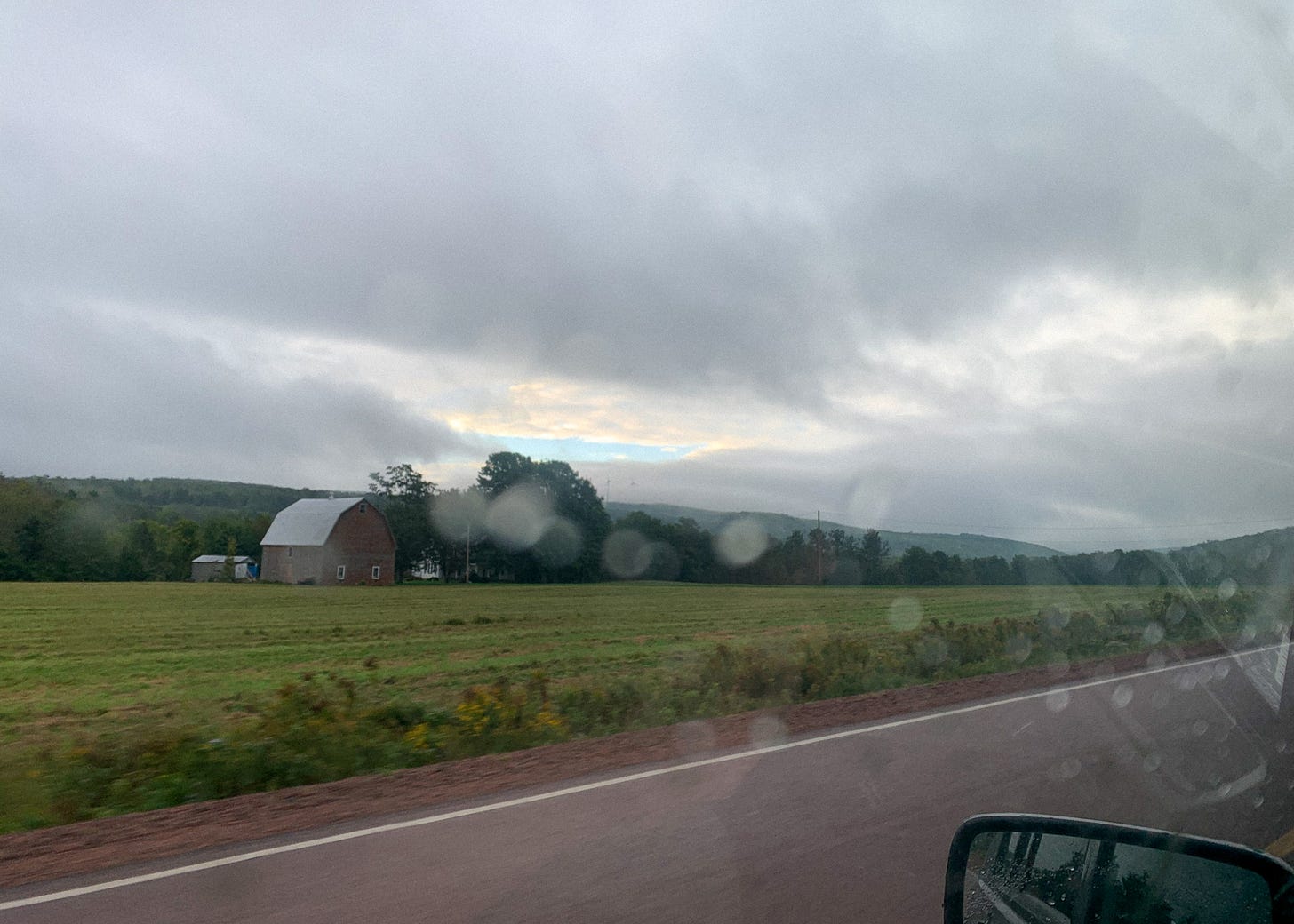A Guide to Nowhere, Part Two
The english version of a Japanese serial on rural Nova Scotia
Hi. This is the second part of a series my label in Japan asked me to write about living in rural Nova Scotia. The forthcoming Japanese translation will be available here, and here’s part one, in case you missed it.
I woke up to the whirring of an electric saw. Adrian was in the workshop, shaping a new handle for his ancient stovetop espresso maker. I leaned against a chest freezer and felt the sawdust and flotsam and jetsam carpeting the floor press into my bare feet. I said he would be doing the same thing in forty years. He agreed. We smiled and hugged each other. Rain pounded on the metal roof overhead.
They’re calling for a hurricane today, and I’m continuing my drive into the city.
Here’s what happens every two weeks: Tuesday after work, I drive forty-five minutes along the coast to drop off my mother’s mail and visit with her—never long enough to appease her loneliness, nor relieve my guilt of neglect—then twenty minutes inland to Mark’s studio for meditation, where a group of us sit in silence and pay attention to the ever-shifting psychedelia of our minds and bodies for an hour. After tea and cookies, I walk up the moonlit road to Adrian and Margaret’s homestead, where I sleep like a million bucks in the whispering of the surrounding trees. The following morning I continue my journey, an hour and a half to Halifax for a day of meetings.
Leaving Adrian to continue his never-ending work of rebuilding the world around him, I drove through the morning fog and rain, past the wetlands and up into the hills. Like my father, I too am a driver. Enclosing myself in a wheeled steel chamber and allowing my body to effortlessly connect into a system of marvellous engineering—the engine my own heart, the tires my feet—brings a kind of peace.
Just like in meditation, driving makes you aware that you’re both arriving and departing at every instant, and that it actually feels quite good.
Looking out through the drops of rain evacuating the windshield, I felt a deep love for the surrounding hills. Their silent gravity can oppress as much liberate, depending on how you meet them. Today they represent uplifting vitality rather than crushing oblivion, which means I’m in the right frame of mind.
Driving meditation insight: commitment means passing through ignorance to arrive at the source: that these hills are as much me as I am them. To scorn them is to scorn myself. They existed before me and will continue to exist after I’m gone. They are settling back into the earth, slowly eroding into dust. They used to be tall and sharp, now they are short and round: the tail end of Appalachia.
The old is disguised as the new. Even when the hills lie flat, they’ll still be there.
The Earltown General Store is nestled at a fork in the road where one rural highway splits into two. Earltown, the village itself, is also. There’s the store, the community hall, a scattering of houses, and not much else. If you drove through at legal speed, you would pass it all in a handful of seconds.
This week, I’m stopping at the store for a cup of green tea and an oatmeal raisin cookie. Last week, I was across the street in the community hall with a handful of other locals, paired with almost as many professionals from the city. Us, the locals, wearing stained t-shirts and tired jeans; them, the professionals, costumed in crisp and stretchy business-casual attire.
It was a meeting about a massive wind-farm slated to be built nearby. The locals came to protest, or ask questions, or eat their fill of complimentary egg salad sandwich quarters. The professionals came because they were paid to by the consulting company they work for.
Photo: Joan Baxter / The Halifax Examiner
A handful of placards were spread around the room in a semicircle, each displaying a few vapid bullet points and illustrations. The professionals were also spread around the room, masking their nervousness with overzealous welcome, hoping to diffuse and distract their visitors.
Keep in mind: there is no cell service here, nor a police unit. Events of this nature have become heated in the past. The professionals have reason to be scared.
One of the men in my meditation group was arrested while protesting a gold mine here a few years back. Like us, these hills contain a multitude of treasures. Unlike us, these hills accept reality: that they are not the trees nor the wind passing through the trees nor the rocks nor the minerals nor the animals nor the humans that inhabit their slopes. They have nothing to lose and nothing to gain.
As the room filled up, award-winning journalist Joan Baxter walked around with a microphone and drilled people. I think Joan deserves to be placed in the Order of Canada. Whether or not she would accept the appointment is a different matter.
She’s written a handful of articles on the case (The Guardian, The Energy Mix parts 1, 2), and my understanding of the situation, largely informed by her reporting, is as follows:
An American company owns a fuel plant in Nova Scotia.
They want to make hydrogen and ammonia, to sell to Germany for fertilizer.
They’ve signed a deal with Germany, saying they’ll do this.
They want the hydrogen and ammonia to be “green.”
They are going to make it whether or not it is green.
They want to build wind farms equal in size to those owned by Nova Scotia Power (the privately-owned company we all are forced to buy our electricity from).
Nova Scotia Power generates most of its electricity from burning coal and trees.
The Government of Nova Scotia has dollar signs in its eyes.
And the whole thing reeks of greed masked as green.
That said, I still buy dirty power, consume more than I ought to, drive too much, and smoke cigarettes. Several times a day, I actually allow my body to be polluted by a tiny smokestack.
As my own behaviour precludes me from offering judgement or advice, I will defer to someone more qualified:
I mentioned in my last entry that I had become a parent. I was very scared about bringing a child into this world. Then I remembered that this world is as profound as it is terrifying, the point of suffering is to gain understanding, and the point of life is to live.
Here’s an outtake from my recent album Bardo, called “Letter to My Unborn Child.”
At first, I fancied this was going to be a monthly series. Then quarterly, now bi-annually.
Summer came and went and I barely noticed. It started off hot, and the forests burned. Then it got wet, and our roads and rivers and basements flooded. I have to patch a section of my roof so water will stop leaking into my baby’s room, and I’m wondering whether it’s wiser to do so before or after the conclusion of hurricane season.
I swear, it wasn’t my intention to only talk about the weather in this series. What else would I like to tell the few people in Japan who might be reading this?
Over the summer, some friends from Montréal came to visit. When they walked into our house, they smiled. We’ve made a nice home here, though the signs of strife aren’t obvious if you don’t know where to look: faded streaks of blood on the walls, salt-spots on the floor where sweat and tears have evaporated, the lines in our faces and grey hairs we’ve accumulated, and the bin of failed attempts to painstakingly scribe and sculpt pieces of finishing trim, which is still growing to this day.
To a weary city-dweller, this place can appear as a refuge. And in terms of city ailments, it is: little noise, much light, no landlord (unless you consider the bank one), and trees and water all around. It’s a cute town. It’s near the ocean. It’s relatively affordable by today’s standards. The air is fresh and clean. It’s not lost on me that these are all amazing privileges, and I consider myself lucky.
But, these things come at a cost: long, isolated winters; no cutting-edge cultural activity; a feeble economy with limited employment options; a crumbling service sector; the constant threat of mild to extreme natural disaster. All in all, you’re vulnerable. If you rely on distraction to maintain your happiness, as most of us do to some degree, you are going to have a challenging time.
Here’s a poem that comes to mind whenever I encounter someone with dreams of escaping their personal metropolis, like I myself once did:
The City, by C.P. Cavafy
Translated by David Connolly“I’ll leave for other lands,” you said, “I’ll leave for other seas.
Another city better than this is certain to be found.
All my endeavours are by fate condemned;
and — like a corpse — my heart lies buried.
Till when will my mind go on wasting away.
Wherever I turn my gaze, wherever I look
I see my life gone to rack and ruin here,
Where I spent and spoiled and squandered so many years.”You won’t find new parts, you won’t find other seas.
The city will follow you. You’ll wander its streets,
the same streets. And in the same districts you’ll grow old;
and in these very same houses turn grey.
This is the city you’ll always reach. Of places elsewhere
— don’t hold out hope —
for you there’s no boat, no path for you.
As you spoiled your life here
in this little corner, so you squandered it the world over.
C.P. might be a little unforgiving here, but there’s a truth in what he’s saying: paradise is not a place, it’s a state of mind, and it’s available to us at any time. Or, as a Zen master once said, “if you’re on top of a beautiful mountain, don’t go looking for another beautiful mountain.”
The key is to recognize that the mountain you’re on is beautiful.
IV




what a great read :)